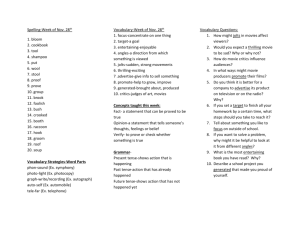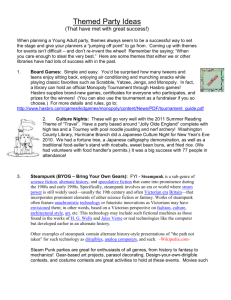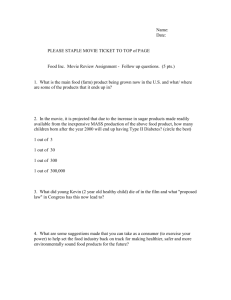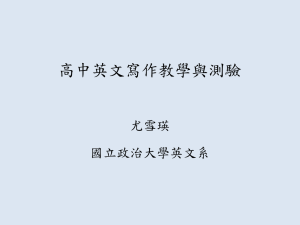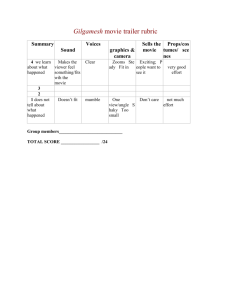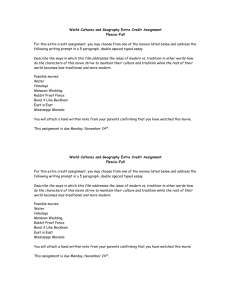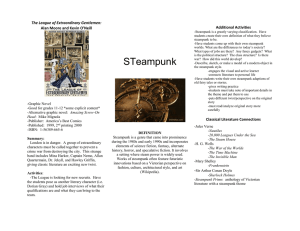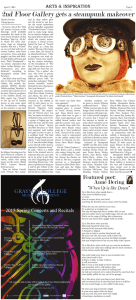UsingSix-TraitMentor.. - Arizona State University
advertisement
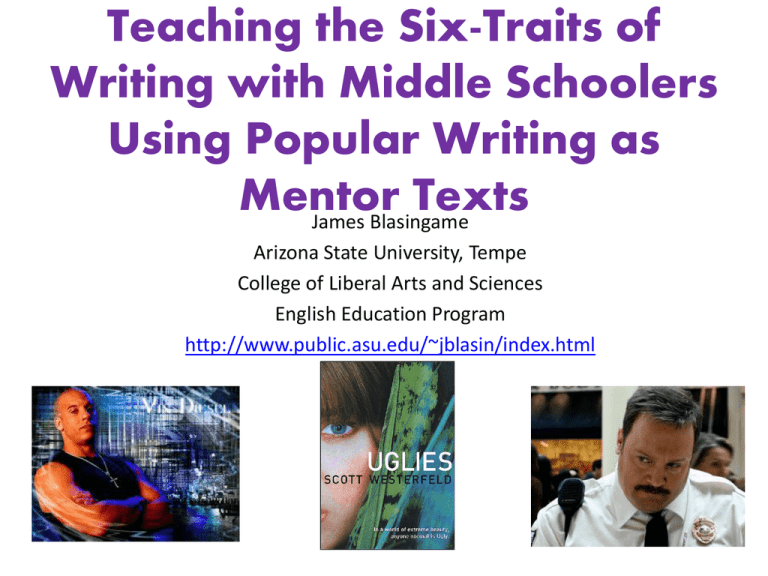
Teaching the Six-Traits of Writing with Middle Schoolers Using Popular Writing as Mentor Texts James Blasingame Arizona State University, Tempe College of Liberal Arts and Sciences English Education Program http://www.public.asu.edu/~jblasin/index.html Movies and Popular Young Adult Novels What if we used their interests to develop their writing skills? • • • • • Popular movies Movie clips Movie reviews Six Traits Passages from popular books Young people watch movies often and talk about them constantly. Writing movie reviews would be a way for them to develop their writing skills and, with our help, grow in their understanding of how to use the Six-Trait Model to improve their skills. Let’s take a look at a review of a popular movie, but first let’s get a feeling for the film from this trailer. http://www.imdb.com/video/imdb/vi2299986713/ Fast and Furious “Vin Diesel and Paul Walker reteam for the ultimate chapter of the franchise built on speed—Fast & Furious. Heading back to the streets where it all began, they rejoin Michelle Rodriguez and Jordana Brewster to blast muscle, tuner and exotic cars across Los Angeles and floor through the Mexican desert in the new high-octane action-” Hmmm. . . Where do you think that appraisal of the movie came from, the company that made the movie or an objective reporter who reviews films? How do the professionals write movie reviews for the newspaper? Let’s take a look at one by Christy Lemire in the Arizona Republic and see if we can figure it out. • http://www.azcentral.com/thingstodo/movies/a rticles/2009/04/02/20090402fast0403.html Noise, noise, noise. Crunched metal and shattered glass. More noise. Revving engines. Vin Diesel's giant head. Hot chicks in tight miniskirts. Even more noise. The end. That's pretty much all there is to "Fast & Furious," essentially a remake of the 2001 hit "The Fast and the Furious" with the same cast, except it seems to exist in some parallel universe where the word "the" no longer exists. It also seems to function outside of logic, cohesive plot structure and the laws of gravity, but hey - this being the fourth film in the street-racing series, such niceties have long since been tossed out the widow and run over repeatedly. Justin Lin, who also directed Part 3, 2006's "The Fast and the Furious: Tokyo Drift," piles on the mind-bogglingly elaborate chase scenes and set pieces. (The opening, in which our rebellious heroes attempt to steal gas from a speeding tanker truck, is admittedly a doozy.) But you've seen a lot of these sorts of stunts in the previous movies and heard the same kind of cheesy dialogue - so it's strange to witness how seriously "Fast & Furious" takes itself, like it's reinventing the 19inch wheel or something. Snarling bad guys, women who pout beautifully and, of course, a wide array of brightly hued, wildly souped-up cars - but not an ounce of creativity or grace. And the fact that it's so repetitive only magnifies how little this latest installment has to offer. What's the movie about, you ask? Well, not that it matters, but Diesel's fugitive ex-con Dom Toretto is back in Los Angeles and out for revenge. He ends up reluctantly re-teaming with former undercover cop Brian O'Conner (Paul Walker), who infiltrated Dom's gang and dated his sister, Mia (Jordana Brewster), in Part 1. This time, their goal is to take down a drug kingpin who's behind a murder. Their strategy leads them into a series of ridiculously illegal races, which make the streets of LA more dangerous to drive on than they already are. There's also an enormously convoluted trip into Mexico, which seems to take place only to set up the film's climactic (and claustrophobic) underground-tunnel chase. Diesel is the same guy here as always: the gravelly, lowkey, beefy action hero. He does get to show off his sensitive side, though, when Dom sits awake at night, watching his girlfriend Letty (Michelle Rodriguez) peacefully sleep. Walker, meanwhile, eerily resembles Alex Rodriguez as he inches into his mid-30s: same eyes, same mouth, same blank expression on his face. If you're into automotive minutiae, you'll probably get off on the details here. And if you're into gratuitous shots of women making out with each other, well, you may sporadically enjoy yourself, as well. But if you like you use your brain . . . dude. Drive on. Now, let’s work in our groups to list the things you noticed about the review of Fast and Furious in terms of Organization, Voice, or Ideas. Your handout will give you some help to analyze the writing. What did you find to be true about Organization, Ideas and Voice in this review? Now, Let’s look at another review and see if our characterization of the genre hold true. But first, again, let’s get a little taste of the movie: • http://www.imdb.com/video/imdb/vi1000931865/ • http://movies.nytimes.com/2009/01/16/movies/16paul.html • Now, let’s read a review from Nathan Lee and the New York Times about Paul Blart: Mall Cop. A Hapless Security Guard Runs Amok By NATHAN LEE Fat people are funny. Fat people who fall over are funnier. Fat people who fall over and have humiliating working-class jobs? Stop, you’re killing me! This would seem to be the entire guiding principle behind “Paul Blart: Mall Cop,” a tossed-off comedy from Adam Sandler’s production company that makes one long for the comparative genius of “I Now Pronounce You Chuck & Larry.” In the title role, Kevin James plays a lovable New Jersey doofus whose dreams of joining the police are foiled by a hypoglycemic condition that causes him to pass out in ostensibly hilarious contexts. Reduced to working security at a huge, bustling shopping mall located in some economically vibrant fantasyland, Blart falls in love with the perky proprietress of a hair-extension franchise (Jayma Mays). Enter — because why not? — a gang of thieves plotting to hack into the mall’s credit-card profits. Put down the nachos, Paul Blart! It’s time to, well, to fall over some more and bump into things and make silly faces and save the world and get the girl. “Paul Blart: Mall Cop” is directed by Steve Carr, a man who knows how to put a camera in front of things, if little else, and written, sort of, by Nick Bakay and Mr. James. Let’s return to our group conclusions on Organization, Ideas, and Voice for the review of Fast and Furious and see if this review of Paul Blart: Mall Cop has the same characteristics. Ideas Organization Voice Now that we have analyzed the writing in movie reviews for Voice, Ideas, and Organization, it’s time to employ our own writing talents to review a recent movie. Remember to make use of what we have learned about the genre and use of the Six Traits in this genre. • Are there any movies coming to town that you would like to see? Let’s look at a couple of trailers. http://www.breakingdawnthemovie.com/ http://www.youtube.com/watch ?v=UrbHykKUfTM For Wednesday, write a movie review of 700 words or more. Attempt to accomplish the objectives we listed, attempt to find the right voice to share your opinion in, and make the review rough, not polished. Another Popular Text for Helping Students Improve Writing through the Six-Trait Model: Young Adult Novels Arizona Department of Education Scoring Rubric for Conventions: 6 The writing demonstrates exceptionally strong control of standard writing conventions (e.g., punctuation, spelling, capitalization, paragraph breaks, grammar and usage) and uses them effectively to enhance communication. Errors are so few and so minor that the reader can easily skim right over them unless specifically searching for them. The writing is characterized by • strong control of conventions; manipulation of conventions may occur for stylistic effect. • strong, effective use of punctuation that guides the reader through the text. • correct spelling, even of more difficult words. • paragraph breaks that reinforce the organizational structure. • correct grammar and usage that contribute to clarity and style. • skill in using a wide range of conventions in a sufficiently long and complex piece. • little or no need for editing. • • Arizona Department of Education Scoring Rubric for Organization: 6 The organization enhances the central idea(s) and its development. The order and structure are compelling and move the reader through the text easily. The writing is characterized by • effective, perhaps creative, sequencing; the organizational structure fits the topic, and the writing is easy to follow. • a strong, inviting beginning that draws the reader in and a strong satisfying sense of resolution or closure. • smooth, effective transitions among all elements (sentences, paragraphs, and ideas). • details that fit where placed. Arizona Department of Education Scoring Rubric for Ideas/content: 6 The writing is exceptionally clear, focused and interesting. It holds the reader’s attention throughout. Main ideas stand out and are developed by strong support and rich details suitable to audience and purpose. The writing is characterized by • clarity, focus, and control. • main idea(s) that stand out. • supporting, relevant, carefully selected details; when appropriate, use of resources provides strong, accurate, credible support • a thorough, balanced, in-depth explanation/ exploration of the topic; the writing makes connections and shares insights. • content and selected details that are well suited to audience and purpose. • Steampunk is a sub-genre of fantasy and speculative fiction that came into prominence in the 1980s and early 1990s. The term denotes works set in an era or world where steam power is still widely used—usually the 19th century, and often Victorian era England—but with prominent elements of either science fiction or fantasy, such as fictional technological inventions like those found in the works of H. G. Wells and Jules Verne, or real technological developments like the computer occurring at an earlier date. Other examples of steampunk contain alternate history-style presentations of "the path not taken" of such technology as dirigibles, analog computers, or digital mechanical computers (such as Charles Babbage's Analytical engine); these frequently are presented in an idealized light, or with a presumption of functionality. • Steampunk is often associated with cyberpunk and shares a similar fanbase and theme of rebellion, but developed as a separate movement (though both have considerable influence on each other). Apart from time period and level of technological development, the main difference between cyberpunk and steampunk is that steampunk settings usually tend to be less obviously dystopian than cyberpunk, or lack dystopian elements entirely. Various modern utilitarian objects have been modded by individual artisans into a pseudo-Victorian mechanical "steampunk" style, and a number of visual and musical artists have been described as steampunk. • Steampunk affinity group website: http://steampunkworkshop.com/ • Steampunk online magazine (ezine): http://www.steampunkmagazine.com/ • Steampunk clothing and accessory line: http://www.steampunkemporium.com/steam.php?source=google&ca mpaign=steampunk&gclid=CL7BsMCblZ4CFRESawod-GY4ow Arizona Department of Education Scoring Rubric for Word Choice: 6 Words convey the intended message in an exceptionally interesting, precise, and natural way appropriate to audience and purpose. The writer employs a rich, broad range of words, which have been carefully chosen and thoughtfully placed for impact. The writing is characterized by – accurate, strong, specific words; powerful words energize the writing. – fresh, original expression; slang, if used, seems purposeful and is effective. – vocabulary that is striking and varied, but that is natural and not overdone. – ordinary words used in an unusual way. – words that evoke strong images; figurative language may be used. Arizona Department of Education Scoring Rubric for Sentence Fluency: 6 The writing has an effective flow and rhythm. Sentences show a high degree of craftsmanship, with consistently strong and varied structure that makes expressive oral reading easy and enjoyable. The writing is characterized by • a natural, fluent sound; it glides along with one sentence flowing effortlessly into the next. • extensive variation in sentence structure, length, and beginnings that add interest to the text. • sentence structure that enhances meaning by drawing attention to key ideas or reinforcing relationships among ideas. • varied sentence patterns that create an effective combination of power and grace. • strong control over sentence structure; fragments, if used at all, work well. • stylistic control; dialogue, if used, sounds natural. What is Voice? • • • • • • Heart/soul Wit Magic Feeling Life and breath Personal tone and flavor different from other writers or texts
